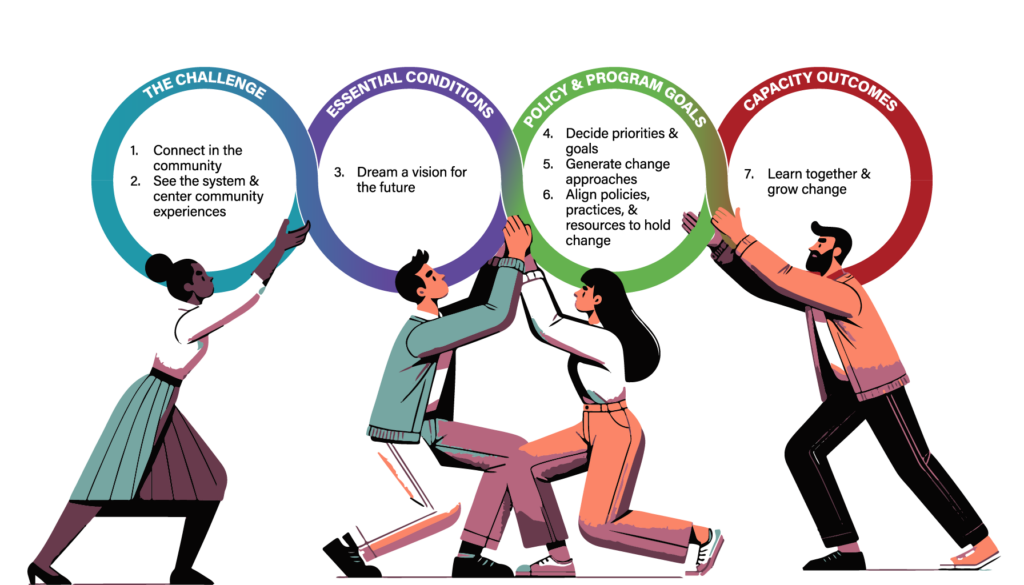Foundational Frameworks for Community Engagement
Alongside California’s new funding system, a reimagined accountability framework established new priorities and measures of school success, including student engagement and parent involvement. During the annual Local Control and Accountability Plan (LCAP) development process, school districts are expected to engage community members to guide planning, budgetary, and improvement efforts. These changes to California’s education funding and accountability systems are a part of the state’s efforts to center capacity building and encourage continuous school improvement instead of punitive interventions (Furger, Hernández, & Darling-Hammond, 2019).
While the LCFF set the precedent for mandated partnerships with community members in school and district decision-making, capacity building for community engagement is fundamental to community partnerships that help generate meaningful change. With this in mind, the state launched the California Community Engagement Initiative, a multi-million dollar statewide investment to increase the ability and capacity of education systems to implement effective, equitable and culturally responsive community engagement practices.
Guiding Frameworks for California’s Community Engagement Approach
Two foundational frameworks inform California’s approach to community engagement: Dual Capacity-Building for Family-School Partnerships and Participatory Systems Change for Equity.
Dual Capacity Building Framework for Family-School Partnerships
First published in 2013 and revised in 2019, the Dual Capacity-Building framework marked an important shift in the literature on family engagement, as it distinguished between the intent versus the impact of conventional family engagement initiatives. Lead author Karen Mapp asserts that a dual approach is necessary to build and activate educator and family capacity to support students and improve schools. Look to the Dual Capacity-Building website to learn more about the framework.
Participatory Systems Change for Equity Framework
The Participatory Systems Change for Equity framework takes a wider view of the potential that community partnerships have to challenge and transform inequitable system conditions. The inquiry guide details technical and adaptive strategies for systems change within child-, youth-, and family-serving agencies. Look to the Participatory Systems Change for Equity Inquiry Guide for:
- Questions to help system leaders examine policies, practices, and mental models related to participatory systems change efforts
- Key resources for implementing elements of the Participatory Systems Change for Equity framework
Five shared values link these two frameworks
Centering the experiences, voices, and strengths of those most impacted by systemic oppression, communities of color, low-income communities, people with disabilities, and LGBTQ+ communities, is essential to advancing equity and inclusion in community engagement.
Promoting trust-building among all community members and challenging traditional approaches of community engagement will yield more effective partnerships.
Building individual, collective, and systemic capacity is crucial to ensuring that community members can meaningfully partner in change efforts.
Co-creation and shared power among students, families, community partners, and leaders.
A strengths-based approach prepares educators and leaders to recognize and build upon the cultural wealth present in families and communities.
Reflection
Take some time to make connections between the foundational frameworks and the work of your school or district by reflecting on the following questions:
Yosso, T. J. (2005). Whose culture has capital? A critical race theory discussion of community cultural wealth. Race Ethnicity and Education, 8(1), 69–91. https://doi.org/10.1080/1361332052000341006
Valdez, A., Cerna, R., & Hashmi, S. (2023). Participatory systems change for equity: An inquiry guide for child-, youth-, and family-serving agencies. California Center for School Climate & Center to Improve Social and Emotional Learning and School Safety. WestEd.

